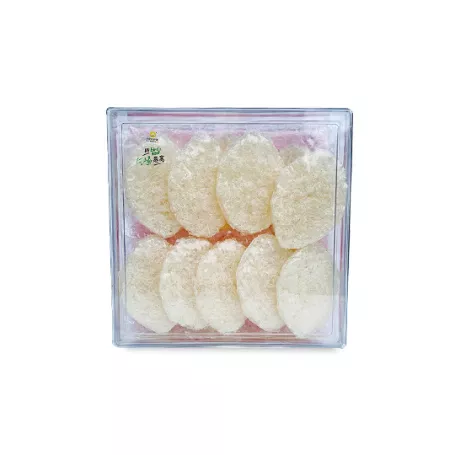Edible Bird's Nests: Nutrients, Benefits, Downsides

Edible bird's nests, known for their rich nutritional value and health benefits, have been considered a luxury delicacy in Asian cultures for centuries. They are created from the saliva of swiftlets, which hardens into the nests that are later harvested, cleaned, and processed for human consumption. Often used in soups, tonics, and desserts, bird's nests are believed to offer various health advantages such as anti-aging properties, immune system support, and faster recovery from illness. However, they also come with drawbacks such as high cost, potential allergens, and environmental concerns due to unsustainable harvesting. In this comprehensive article, we will discuss the nutritional content, health benefits, and potential downsides of bird's nests, with a specific focus on Baizigui’s distribution of Eu Yan Sang bird’s nest products.
Nutritional Content of Bird's Nests
High Protein Content
Edible bird’s nests are primarily composed of protein, with concentrations ranging between 50-60%, making them an excellent source for muscle repair and growth. Protein plays a vital role in the body’s building and repairing of tissues. This makes bird's nests particularly beneficial for athletes or people recovering from surgery or illness.
Rich in Essential Amino Acids
Bird's nests contain all nine essential amino acids, which are necessary for various bodily functions such as cell regeneration and tissue repair. Key amino acids such as proline, serine, and threonine help stimulate collagen production, which in turn supports skin elasticity and overall health. Amino acids also play a significant role in muscle recovery and brain function, contributing to overall well-being. This makes bird's nests a valuable dietary supplement for people seeking to boost cellular regeneration and enhance recovery.
Glycoproteins for Immune Support
Another notable component of edible bird’s nests is glycoproteins, complex molecules that combine carbohydrates and proteins. These glycoproteins are believed to boost the immune system by regulating the body’s immune responses, improving the body’s ability to ward off infections. Studies have shown that bird's nests may increase the production of white blood cells, which are key in fighting infections and illnesses. This immune-enhancing property makes bird’s nests highly valuable for people recovering from illness, surgery, or those with compromised immune systems.
Packed with Minerals
Bird's nests are also rich in essential minerals such as calcium, iron, potassium, and magnesium. These minerals contribute to several key functions:
1.Calcium helps maintain bone health and prevent osteoporosis.
2.Iron is vital for oxygen transport in the blood, preventing anemia.
3.Potassium regulates heart function and helps maintain a healthy electrolyte balance.
4.Magnesium supports muscle and nerve function.
These minerals collectively support a healthy cardiovascular system, strong bones, and optimal muscle function, making bird's nests beneficial for overall bodily health.
Low Fat and Cholesterol
Bird’s nests are low in fat and cholesterol, which makes them an ideal option for individuals who are monitoring their heart health or those who are trying to manage their weight. A low-cholesterol diet can significantly reduce the risk of heart disease, making bird's nests a valuable part of a heart-healthy diet.
Hormonal Components
Bird’s nests also contain small amounts of hormones, such as testosterone and estradiol, which may play a role in regulating bodily functions. Estradiol, in particular, may assist in bone maintenance, potentially reducing the risk of osteoporosis in postmenopausal women.
Health Benefits of Edible Bird's Nests
The nutrient-rich profile of bird’s nests translates into numerous health benefits. Here are some of the most notable:
Anti-Aging and Skin Health
Bird's nests are widely recognized for their anti-aging properties, mainly attributed to their amino acids and glycoproteins. The ability of these compounds to promote collagen production helps reduce wrinkles, improve skin elasticity, and give the skin a more youthful appearance. For this reason, bird's nests are commonly used in skincare products and supplements. Regular consumption of bird's nests is believed to improve skin hydration, reduce the appearance of age spots, and enhance the skin’s overall texture.
Immune System Boost
The immune-boosting properties of bird's nests stem from their high glycoprotein content. These glycoproteins enhance the body’s ability to fight off infections by regulating the immune response and increasing the production of white blood cells. For individuals recovering from illness or surgery, consuming bird's nests can aid in faster recovery and bolster the immune system to prevent further infections.
Respiratory Health Benefits
Research suggests that bird’s nests may benefit individuals with respiratory conditions such as asthma. The bioactive compounds in bird’s nests have been shown to reduce inflammation in the airways, potentially easing breathing difficulties. Bird's nests may also alleviate symptoms of chronic coughs and improve lung function.
Digestive Health
Bird's nests contain bioactive compounds that can help repair the gut lining, thus promoting digestive health. This is especially helpful for individuals suffering from digestive disorders such as acid reflux, irritable bowel syndrome (IBS), or gastritis. By improving the overall health of the gastrointestinal tract, bird's nests can help balance gut flora and promote better digestion.
Supports Recovery from Illness and Surgery
Given their high protein and mineral content, bird’s nests are often recommended for individuals recovering from surgery, chronic illness, or injury. The proteins and minerals in bird’s nests aid in tissue repair, boost energy levels, and facilitate the body’s natural healing process.
Potential Downsides of Edible Bird's Nests
Despite the numerous benefits of bird's nests, there are several potential downsides to consider before incorporating them into your diet.
High Cost
One of the primary drawbacks of edible bird’s nests is their high cost. The process of harvesting and cleaning bird’s nests is labor-intensive, which drives up the price. As a result, bird’s nests are often viewed as a luxury food item, making them inaccessible to many people. The cost is further inflated by the rarity of authentic bird’s nests, particularly those harvested from caves, which are often more expensive than those harvested from birdhouses.
Allergy Risk
Bird's nests can cause allergic reactions, particularly in individuals with shellfish allergies. Since the proteins in bird's nests may trigger similar immune responses to those caused by shellfish, individuals with such allergies should consult with a healthcare provider before consuming bird's nests. Symptoms of an allergic reaction may include rashes, difficulty breathing, or even anaphylaxis in severe cases.
Environmental Concerns
The growing demand for bird’s nests has led to unsustainable harvesting practices, particularly in Southeast Asia. Overharvesting from natural caves can disrupt swiftlet populations and damage local ecosystems. Unethical harvesting practices may also result in swiftlets being forced out of their natural habitats, leading to a decline in their numbers. To counteract this, some producers have shifted to birdhouse farming, which provides a more controlled and sustainable way to harvest nests. It is essential for consumers to ensure that the bird’s nests they purchase come from sustainable and ethical sources.
Contamination Risk
Bird's nests that are not properly processed may be contaminated with harmful substances such as nitrates, heavy metals, or pesticide residues. Contaminated bird's nests pose a serious health risk and can lead to poisoning or other adverse health effects. It is therefore crucial to purchase bird’s nests from trusted suppliers who adhere to strict quality control and food safety standards.
Counterfeit Bird's Nests
Due to their high value, the market for bird's nests is rife with counterfeit products. Some sellers mix bird's nests with non-edible substances, use artificial coloring to mimic the rare “red bird’s nests,” or sell nests that have been adulterated with chemicals. Consumers must be cautious and purchase from reputable brands that offer genuine and authentic bird’s nests.

Baizigui’s Distribution of Eu Yan Sang Bird's Nest Products
As a trusted distributor, Baizigui offers a wide selection of high-quality bird's nest products from Eu Yan Sang, one of the most reputable brands in the health and wellness industry. Eu Yan Sang is known for its strict production standards, ensuring that its bird’s nests are ethically sourced, processed safely, and meet the highest quality standards.
Eu Yan Sang's Commitment to Quality
Eu Yan Sang’s bird's nests undergo rigorous testing for purity and safety, ensuring that they are free from harmful contaminants and chemicals. The company is committed to sustainable harvesting practices, ensuring that the nests are collected in an environmentally friendly way without harming swiftlet populations. By purchasingEu Yan Sang, they are getting high-quality bird’s nests that are authentic and sustainably sourced. This guarantees that customers receive pure, genuine products that offer the full nutritional benefits of bird's nests without the risks associated with contamination or environmental harm.
Range of Products
Eu Yan Sang offers a variety of bird's nest products, including pure bird’s nests, concentrated bird’s nest drinks, and bird’s nest with additional herbs for specific health benefits. These products are designed to cater to different consumer needs, from those seeking a convenient, ready-to-consume option to those preferring to prepare their bird’s nests at home. Each product is carefully formulated to maintain the integrity of the bird's nest's nutrients, ensuring that the health benefits are preserved.
Conclusion and Call to Action
Edible bird's nests offer a wide range of nutritional benefits, including high levels of protein, essential amino acids, glycoproteins for immune support, and important minerals that support bone health, muscle function, and cardiovascular well-being. Regular consumption of bird’s nests has been linked to improved skin health, anti-aging effects, respiratory relief, and faster recovery from illness or surgery. However, potential downsides include the high cost, risks of allergic reactions, environmental concerns related to overharvesting, and the prevalence of counterfeit products in the market.
To fully enjoy the health benefits of bird's nests while avoiding these risks, it is essential to purchase from trusted suppliers who adhere to high standards of quality and sustainability. Baizigui, as an official distributor of Eu Yan Sang bird’s nests, offers consumers peace of mind by providing authentic and safe products from a brand known for its commitment to purity and environmental responsibility.
If you're considering incorporating bird's nests into your diet, be sure to source them from reputable distributors like Baizigui, ensuring that you receive only the highest quality bird’s nests that deliver the full spectrum of health benefits.
FAQs
1.What is the main ingredient of edible bird’s nests?
The main ingredient is the hardened saliva of swiftlets, which forms the base of the bird's nest and is rich in essential nutrients.
2.How are bird's nests harvested?
Bird's nests are harvested from natural caves or specially constructed birdhouses. The nests are collected after the swiftlets have finished using them, cleaned, and processed for human consumption.
3.Is it safe to consume bird's nests daily?
Bird’s nests are generally safe for daily consumption, but it’s advisable to consume them in moderation. Individuals with allergies or underlying health issues should consult a healthcare provider before adding bird’s nests to their diet.
4.Can bird's nests improve skin health?
Yes, bird's nests are known to improve skin health due to their high content of amino acids and glycoproteins, which promote collagen production and enhance skin elasticity.
5.Are all bird's nests in the market genuine?
Unfortunately, not all bird's nests on the market are genuine. Counterfeit products are common, so it is important to purchase from reputable brands like Eu Yan Sang, which guarantees authenticity.

 Bahasa melayu
Bahasa melayu 中文
中文
























